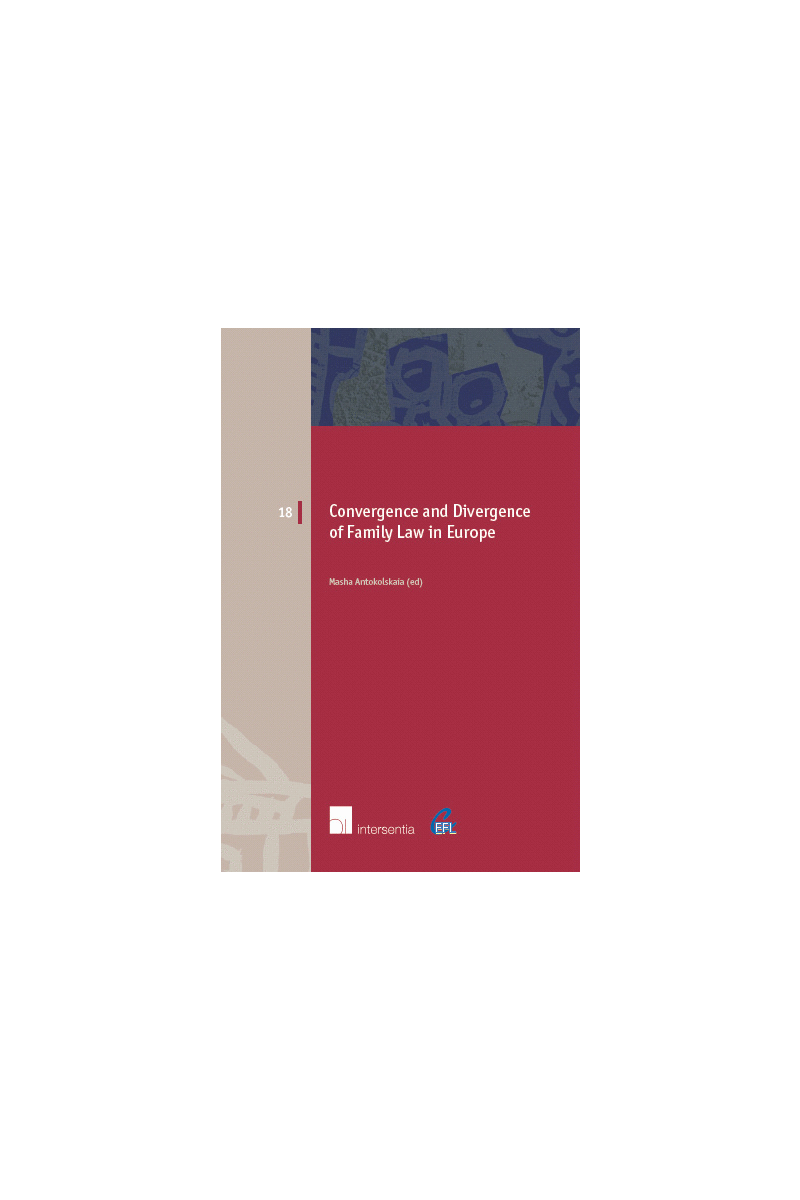 maestro
mastercard
visa
maestro
mastercard
visa

Convergence and Divergence of Family Law in Europe

This volume contains the written versions of presentations given at the international conference “Convergence and Divergence of Family Law in Europe”, organised in Amsterdam in September 2006. The main objective of this conference was to instigate an in-depth discussion regarding various facets of the convergence/divergence discord. Another objective was to give scholars the opportunity to present their respective views in the ongoing debate surrounding convergence, divergence and deliberate harmonisation activities in the field of family law.
In the first part of this book the historical and theoretical issues of the convergence/divergence debate and the controversy surrounding the “cultural constraints” argument are discussed. The second part gives a picture of the contemporary role of convergence/divergence tendencies on a regional level in various parts of Europe. It starts with an overview of the recent trends in the renowned “Nordic co-operation” in the approximation of family laws, which is generally considered to be the most successful example of regional harmonisation of family laws in Europe. The next article deals with convergence/divergence tendencies in the development of the family law of the Spanish autonomous communities. The following two contributions offer a summary of the convergence and divergence trends in Eastern Europe against the background of such sweeping events as the fall of the Soviet Union, the disintegration of the Eastern block and the accession of a majority of the Central European countries to the EU. The third part of this volume deals with the convergence and divergence tendencies in the following particular fields of family law: marriage, divorce, same-sex relationships, establishment of parenthood and matrimonial property law.
| Type of product | Book |
|---|---|
| Format | Paperback |
| EAN / ISSN | 9789050956901 |
| Series name | European Family Law |
| Weight | 500 g |
| Status | Available |
| Number of pages | xiv + 282 p. |
| Access to exercice | No |
| Publisher | Intersentia |
| Language | English |
| Publication Date | Oct 2, 2007 |
| Available on Strada Belgique | No |
| Available on Strada Europe | No |
| Available on Strada Luxembourg | No |
Downloads
- Table of Contents
- INTRODUCTION
Masha Antokolskaia - PART I. THE CONVERGENCE AND DIVERGENCE DEBATE: A NEVERENDING STORY?
- HARMONISATION OF FAMILY LAW IN EUROPE: A HISTORICAL PERSPECTIVE
Masha Antokolskaia - CONVERGENCE AND DIVERGENCE: THEORETICAL ISSUES
Esin Örücü - PART II. FROM DIVERSITY TO SIMILARITY: REGIONAL TENDENCIES
- APPROXIMATION OF NORDIC FAMILY LAW WITHIN THE FRAMEWORK OF NORDIC COOPERATION
Ingrid Lund-Andersen - FAMILY LAW OF SPANISH AUTONOMIES: FOLLOWING A SIMILAR PATTERN?
Miquel Martin-Casals - THE ACCESSION OF BULGARIA TO THE EUROPEAN UNION: A PATH TO THE HARMONISATION OF FAMILY LAW?
Velina Stancheva Todorova - FAMILY LAW IN THE FORMER SOVIET UNION: MORE DIFFERENCES OR MORE IN COMMON?
Olga Khazova - PART III. CONVERGENCE AND DIVERGENCE IN SPECIFIC FIELDS OF FAMILY LAW
- O TEMPORA, O MORES! THE EVOLVING MARRIAGE CONCEPT AND THE IMPEDIMENTS TO MARRIAGE
Frederik Swennen - CONVERGENCE AND DIVERGENCE IN THE LAW ON SAME-SEX PARTNERSHIPS
Ingeborg Schwenzer - MOVING TO THE SAME DESTINATION? RECENT TRENDS IN THE LAW OF DIVORCE
Bea Verschraegen - THE ESTABLISHMENT OF PARENTHOOD: A STORY OF SUCCESSFUL CONVERGENCE?
Caroline Forder, Kees Saarloos - MATRIMONIAL PROPERTY LAW: DIVERSITY OF FORMS, EQUIVALENCE IN SUBSTANCE?
Bente Braat - PART IV: CONVERGENCE AND DIVERGENCE: PRACTICAL AND POLITICAL ASPECTS
- BUILDING ON CONVERGENCE AND COPING WITH DIVERGENCE IN THE CEFL PRINCIPLES OF EUROPEAN FAMILY LAW
Katharina Boele-Woelki - TOWARDS A UNIFORM EUROPEAN FAMILY LAW? A POLITICAL APPROACH. GENERAL CONCLUSIONS
Marie-Therese Meulders